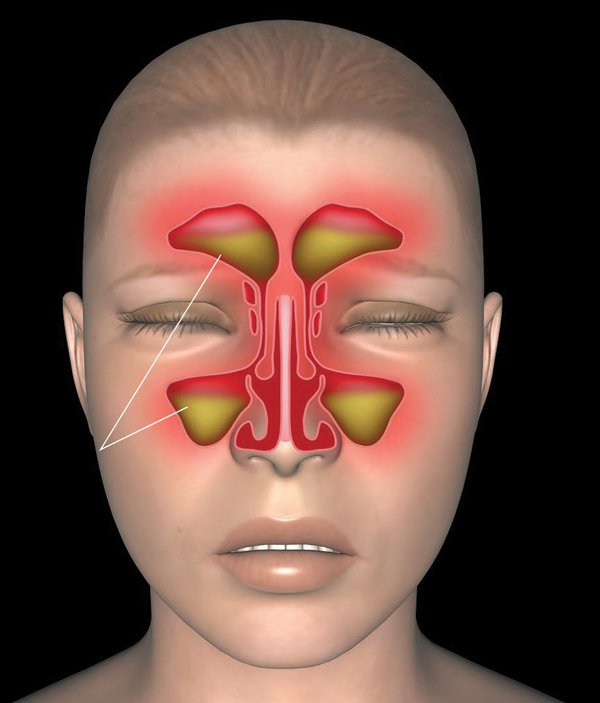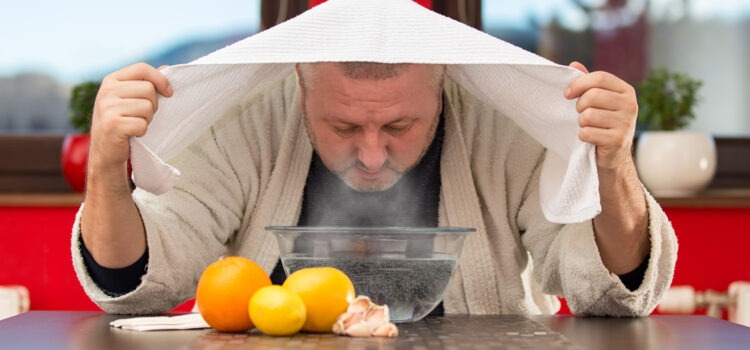There are sinus treatments that do not require medication or invasive surgical procedures. Natural solutions are available and highly effective in providing safe and lasting relief from the frustration of sinus infections. Some of these natural remedies for sinus infections can even be done from the comfort and privacy of your own home.
What is Sinusitis (Sinus Infection)?

The human body has four main sinus cavities that are located in the areas surrounding the nose and eyes. These cavities play a critical role in breathing by controlling humidity and keeping foreign substances out of the body. The lining of these cavities can become inflamed as a result of a virus or bacteria that enter the body, this inflammation is known as sinusitis (sinus infection).
Inflammation prevents the body from naturally draining mucus from the sinus cavities which may lead to further infection and additional symptoms. Sinusitis sufferers often seek relief from these symptoms using over-the-counter medications or prescription antibiotics. Patients may find temporary symptom relief through pharmaceuticals; however, these medications often carry a number of undesirable side effects including:
- Drowsiness or insomnia
- Elevated blood pressure or cardiac complications
- Dizziness and impaired balance
- Individual complications
Treating Sinusitis Naturally
Sinus sufferers who want real relief without pharmaceutical side effects have discovered that natural home remedies for sinus infections are safe and highly effective. These solutions target the underlying inflammation, promote natural sinus drainage, and help prevent additional infections.
The safest and most effective natural solutions involve the use of water in the form of liquid, vapor, or mist. Water penetrates the blockage allowing mucus to drain naturally so that the sinuses can begin the healing process. These solutions have the added benefit of helping to reduce the intensity and duration of sinus symptoms and improving quality of life.

H2O: A natural solvent
One of the most powerful solvents on earth is nothing more than pure water. Water is used in many applications as a thinner, cleaner, and diluter. When it comes to a sinus infection, water can be used in much the same way to thin mucus, clean the sinuses, and dilute a blockage. Natural sinus treatments may involve the use of liquid, mist, or vaporized water.
Vapor (Steam)
One of the most effective ways for water to treat a sinus infection is in the form of steam (vapor). Warm water vapor naturally rises and can easily break through a blocked nasal passage to enter the sinus cavity. As steam continues to pass through a nasal blockage, mucus is thinned and the sinus cavities can begin the process of natural drainage. Vaporized water may also soothe the pain that results from sinus inflammation. Water vapor therapy is a simple and inexpensive home remedy that can be accomplished in a number of ways:
- Warm shower or bath: Spending a few extra minutes breathing deeply through the nose in a warm shower or bath may aid the natural healing process and help alleviate symptoms.
- Steam Pot: A pot or bowl of warm liquid can be carefully placed on a solid surface (table or countertop). Placing a towel or sheet over the head will help to trap the steam. Keeping a safe distance from the bowl, breathe deeply through the nose and allow the steam to penetrate the sinus blockage. Special care should be taken when handling hot liquids as water and steam can both cause burns to the face and body.
- Steam Machine (Warm Mist Humidifier): These electronic devices warm water in order to produce steam that can be breathed into the nasal passages. They may provide a safe alternative to a steam pot as they do not involve transporting hot liquids.

Liquid Water (Sinus Rinse)
Another effective treatment involves introducing a saline (salt) water solution directly into the nasal passages. Nasal rinses come in many forms and involve various mixtures of sterile water and sodium solutions. Some sinus rinses are sprayed into the nose while others are pumped or poured through the nasal passage. Sinus rinses are safe and effective but are not without risk. Special attention should be given to the instructions from the manufacturer. These instructions are designed to prevent injury or further infections from improper use. Some of these instructions may include, but are not limited to:
- Water type: Use only distilled or sterile water. Tap water, bottled water, filtered water, and spring water may be safe to drink, but they are not safe to introduce to the sinus cavities. They may contain trace amounts of bacteria or other organic matter that could result in further inflammation and infection.
- Water temperature: Be careful not to introduce hot water into the sensitive areas of your nasal passage or sinuses as they can easily cause internal burns.
- Water purity: If you are using a reusable sinus rinse container such as a neti pot, be very careful to clean and store it as instructed in order to prevent bacteria growth inside the container.
Mist (Cool Mist Humidifier)
Cool mist humidifiers use forms of technology other than heat to produce a mist from cool water. This mist can be breathed into the nasal passages much like steam in order to reduce blockage and inflammation. It is a safe alternative especially when used for children or the elderly as there is no risk of burns from hot water.

Other Solutions:
In addition to the use of water, vapor, and mist for relief from sinus infections, the following methods are highly effective in helping the body to heal and reduce the severity of sinus symptoms:
- Elevated sleep positioning: Keeping an elevated head at night allows gravity to naturally promote mucus drainage through the nasal passage.
- Proper hydration: More than 50% of your body is made up of water and the body must be properly hydrated for its natural processes to work toward healing infection and inflammation. Be sure to drink plenty of water, even when the symptoms of a sinus infection make it difficult.
- Warm and Cool Compresses: Using a rotation of warm and cool compresses on the face and around the sinus areas will help to reduce inflammation and promote natural drainage. They can also provide natural relief of symptoms such as headaches and sinus pressure. Be very careful when placing hot and cold items on the face as they can result in burns or damage to the skin and eyes. Do not place hot or cold items directly on the skin and limit the amount of time for each compress to 15 – 20 minutes.
Natural Remedies Work
Natural home remedies are a safe and effective solution in the prevention and treatment of sinusitis. These simple and inexpensive solutions offer an alternative to the expense and side effects that often accompany over-the-counter medications. For some sinus sufferers, home remedies may fall short in providing long-term results. For those who suffer frequent or extended sinus infections, it is important to see a medical professional. If left untreated, these sinus infections may impact overall health and could lead to further medical complications in addition to the daily symptoms of sinusitis.
Source: dallasbreathefree.com
